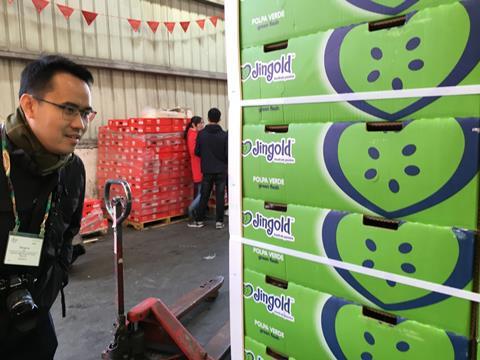
Representatives of some of Italy’s key fresh produce export sectors say they see good potential for further trade access breakthroughs in China, following a recent meeting with key personnel from China’s trade and agricultural regulatory bodies.
At a workshop organised in Beijing by European produce association Freshfel Europe and China’s Entry-Exit Inspection and Quarantine Association (CIQA), members of the Italian fresh produce industry were able to learn more about trade relations between the two countries and to raise concerns over the apparent slow progress being made for certain products in terms of trade access.
“We had the opportunity to present a clear and analytical outline of the situation for exports of Italian produce to China, with the excellent performance of kiwifruit in general and the growth in particular of yellow kiwifruit, and the great potential for the development of the market for pears, apples and citrus fruits” declared Simona Rubbi, who is responsible for opening and developing new markets on behalf of Italian marketing and research body CSO.
Salvo Laudani, marketing manager at Sicilian marketer Oranfrizer and president of trade group Fruitimprese Sicilia, said a breakthrough on sending Italian citrus to China could soon become a reality.
“We described the current situation clearly, asking for the agreement between China and Italy signed in January 2016 to be applied to the campaign now in progress, and for the agreement to be extended to include the possibility in future of transporting citrus fruits not only by sea but also by air or rail,” Laudani explained.
“This opening is vital to guarantee the arrival of products of excellent quality, and I’m convinced that the Beijing workshop offered us a great opportunity in this area.”
Giulia Montanaro of apple and pear association Assomela highlighted the apparent difficulty of establishing a connection with trade officials in China.
In March 2015, she said, the Italian ministry sent an official communication to the Chinese authorities requesting the official opening of export negotiations, but no reply had yet been received.
“We took the occasion of the workshop to stress the desirability of starting joint negotiations for both apples and pears with the greatest urgency.”
The workshop, which also involved produce industry representatives from Belgium, France, Germany, Greece, Netherlands and Poland, was conceived as a way to share knowledge and encourage future trade relations by understanding respective production systems and exploring market access, phytosanitary requirements, food safety policies and product-specific procedures.
Taking part were: Woo Huao, director of China’s AQSIQ Biosecurity Division; Jerome Lepeintre, head of the Agricultural Section of the EU Delegation to China; and Ms Li Li, director of the Economic Crop Division of the Chinese Agricultural Ministry.
The Italian delegation, meanwhile, included First Secretary Enrico Berti and Raffaella Danielato of the Economic and Trade Department of the Italian Embassy in Beijing, and also of the Italian Ministry of Agricultural Policies.



